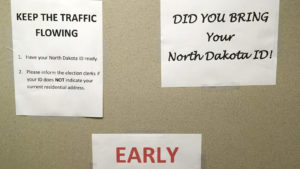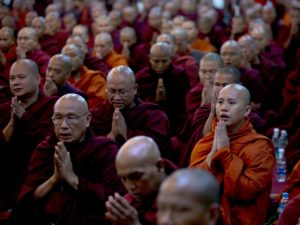10 Datos sobre nuestro planeta que no te enseñaron en la escuela
Video: GENIAL
Eclectic: Temas, eventos, cosas graciosas, recuerdos, suspicacias y otros mangos

Video: GENIAL
By: Camila Domonoske

Image: This June, instructions wre posted at an early voting precinct in Bismarck, N.D. In that primary election, tribal IDs that did not show residential addresses were accepted as voter ID. But those same IDs will not be accepted in the general election.
James MacPherson/AP.
Native American groups in North Dakota are scrambling to help members acquire new addresses, and new IDs, in the few weeks remaining before Election Day — the only way that some residents will be able to vote.
This week, the Supreme Court declined to overturn North Dakota’s controversial voter ID law, which requires residents to show identification with a current street address. A P.O. box does not qualify.
Many Native American reservations, however, do not use physical street addresses. Native Americans are also overrepresented in the homeless population, according to the Urban Institute. As a result, Native residents often use P.O. boxes for their mailing addresses, and may rely on tribal identification that doesn’t list an address.
Those IDs used to be accepted at polling places — including in this year’s primary election — but will not be valid for the general election. And that decision became final less than a month before Election Day, after years of confusing court battles and alterations to the requirements.
Tens of thousands of North Dakotans, including Native and non-Native residents, do not have residential addresses on their IDs and will now find it harder to vote.
They will have the option of proving their residency with “supplemental documentation,” like utility bills, instead of their IDs, but according to court records, about 18,000 North Dakotans don’t have those documents, either.
And in North Dakota, unlike other states, every resident is eligible to vote without advance voter registration — so people might not discover the problem until they show up to cast their ballot.
North Dakota Sen. Heidi Heitkamp, a Democrat, is trailing her Republican opponent in her race for re-election. Native Americans tend to vote for Democrats.
The Republican-controlled state government says the voter ID requirement is necessary to connect voters with the correct ballot, and to prevent non-North Dakotans from signing up for North Dakota P.O. boxes and traveling to the state to vote fraudulently. In 2016, a judge overturning the law noted that voter fraud in North Dakota is “virtually non-existent.”
The state government says that residents without a street ID should contact their county’s 911 coordinator, to sign up for a free street address and request a letter confirming that address.
A group called Native Vote ND has been sharing those official instructions on Facebook.
The Standing Rock Sioux Tribe is telling members to get in touch if they need help obtaining a residential address and updating their tribal ID. The tribe also says it will be sending drivers to take voters to the polls on Election Day.
“Native Americans can live on the reservations without an address. They’re living in accordance with the law and treaties, but now all of a sudden they can’t vote,” Standing Rock chairman Mike Faith said in a statement. “Our voices should be heard and they should be heard fairly at the polls just like all other Americans.”
Meanwhile, the Bismarck Tribune reports that a Native American organization is working to come up with a last-minute solution for voters who would otherwise be turned away:
“Bret Healy, a consultant for Four Directions, which is led by members of South Dakota’s Rosebud Sioux Tribe, said the organization believes it has a common-sense solution.
“The group is working with tribal leaders in North Dakota to have a tribal government official available at every polling place on reservations to issue a tribal voting letter that includes the eligible voter’s name, date of birth and residential address.”
A state official told tribal leaders that such letters will be accepted as proof of residency, the Tribune reports.
Heitkamp called the ID law “burdensome” and once again called for a law to protect the voting rights of Native Americans. She and other legislators have introduced such a bill year after year, unsuccessfully.
“Given the number of Native Americans who have served, fought, and died for this country, it is appalling that some people would still try and erect barriers to suppress their ability to vote,” Heitkamp said in a statement. “Native Americans served in the military before they were even allowed to vote, and they continue to serve at the highest rate of any population in this country.”
The ACLU said the Supreme Court’s decision “enables mass disenfranchisement.” “In an election that may wind up being decided by just a few thousand votes, the court’s decision could be deeply consequential for the country, not just those who live in North Dakota,” staff reporter Ashoka Mukpo wrote on Friday.
In 2016, the Harvard Law Review found that Native Americans “routinely face hurdles in exercising the right to vote and securing representation,” and that the Voting Rights Act of 1965 was only a partial solution to the problem.
In: npr
Video: Drake
Video: Taffie Matiure
Video: Marc Anthony
Video: Bryan Cortes
Video: GianMarcoPeru
Video: Smith Technical Resources
Video: Don Giller
[This] “law is one of four ‘protection laws’ that would affect religious conversion, interfaith marriage, polygamy and population control. These bills, collectively known as the ‘protection of race and religion laws,’ were proposed in 2013 by Ma Ba Tha, a group of nationalistic Buddhist monks.” (washingtonpost.com)
by Anna K. Poole
Posted 7/15/15, 11:48 am

Image: (AP Photo/Gemunu Amarasinghe) – https://nationalpostcom.files.wordpress.com/2015/11/myanmar_pariah_muslims.jpg
Human rights groups are blasting a new law adopted last week in Myanmar, also known as Burma, requiring women to register their intent to marry outside their faith. The legislation gives the government power to halt the marriage of a Buddhist woman to a non-Buddhist man if someone raises objections to the union.
“It’s shocking that Burma’s parliament has passed yet another incredibly dangerous law, this time legislating clearly discriminatory provisions targeting the rights of religious minority men and Buddhist women to marry who they wish without interference,” said Phil Robertson, deputy director of Human Rights Watch’s Asia division.
Myanmar’s new marriage law is the second of a four-part series of bills known as the Protection of Race and Religion Laws, drafted by hardliner Buddhist monks with a staunch anti-Muslim agenda.
In May, President Thein Sein enacted the first of these laws, a population control bill mandating a 36-month gap between children for certain mothers and giving regional authorities the power to implement birth spacing in overcrowded areas. Some argue the legislation is aimed at curbing high birth rates in the Muslim community. The population bill is vague about the penalty for unauthorized births less than three years apart, but it could include coerced contraception, forced sterilization, or abortion.
For a non-Buddhist man in Myanmar, stepping into an interfaith marriage could prove ruinous. According to a recent Human Rights Watch report, the marriage legislation prohibits husbands from “committing deliberate and malicious acts, such as writing, or speaking, or behaving, or gesturing with intent to outrage feelings of Buddhists.” Noncompliance is considered a divorce-worthy offense, sweeping away the man’s land and child custody rights, and punishable with a prison stint of up to four years.
In November, when Sein first sent a draft of the bill to Parliament, The Myanmar Times reported some women’s disapproval.
“We already have restrictions on marriage because we need to marry in the same faith and caste,” said one Burmese woman, who requested anonymity. “I’m curious how this law will actually protect Buddhist women.”
The marriage act changes little for Myanmar’s Rohingya Muslims, one of the most severely oppressed minority groups in the world. Denied citizenship within Burmese borders, the Rohingya are essentially stateless and already face tight restrictions on the right to register marriages, births, and deaths. Since 2012, heavy persecution of minority Rohingya Muslims by radical Buddhist groups has sparked a maritime mass exodus and regional refugee crisis.
By signing the interfaith marriage bill into law, “the [Myanmar] government and ruling party lawmakers are playing with fire,” Robertson said. With the landscape of this Buddhist-majority nation increasingly stained by sectarian violence, legislators risk much by proposing such inflammatory restrictions. The marriage bill, like the population control bill before it, will only add fuel to Myanmar’s simmering religious tension.
The pending half of Myanmar’s Protection of Race and Religion Laws include a monogamy bill criminalizing extramarital affairs and a bill requiring government registration and approval prior to religious conversion.
The Associated Press contributed to this report.
In: world
Video: Al Jazeera English
Video: Kachin Australia
18 Oct 2017: Burma Shows Us What a ‘Muslim Ban’ Really Looks Like: Apartheid
06 Jul 2016: New govt to defend ‘race and religion’ laws at UN meeting
07 Nov 2015: ‘Muslims are dangerous’: Myanmar Buddhist monks threaten democracy with support for anti-Muslim laws
22 Aug 2015: Discriminatory ‘Race and Religion’ bills threaten tensions ahead of elections: APHR
14 Jul 2015: Myanmar law restricting marriage of Buddhist women blasted by EU, rights groups
09 Jul 2015: A trap law for married men and women
18 Dec 2014: Myanmar women object to proposed restrictions on interfaith marriage
28 Jul 2014: Women unite against ethnic and gender discrimination in Myanmar
09 Jul 2015: Burma: Reject Discriminatory Marriage Bill
14 Jul 2014: WHRDs in Burma under threat for opposing Interfaith Marriage Bill
07 Jul 2014: Myanmar’s Parliament Approves Controversial Interfaith Marriage Law
16 Jun 2014: Myanmar President Thein Sein and Speaker of Pyithu Hluttaw Thura Shwe Mann: No Interfaith Marriage Bill
12 Jun 2014: U.S. opposes Burma’s plan to restrict interfaith marriage
05 Jun 2014: Nearly 100 Myanmar Groups Slam Move to Restrict Interfaith Marriages
04 Jun 2014: Fears of new unrest as Myanmar ponders monk-backed interfaith marriage ban
06 May 2014: Women of Burma speak out against Interfaith Marriage Act
27 Mar 2014: Burma’s Muslims Are Facing Incredibly Harsh Curbs on Marriage, Childbirth and Religion
25 Mar 2014: Human Rights Watch calls Myanmar to scrap proposed restrictions on interfaith marriages
25 Mar 2014: Rights Group Slams Proposed Curbs on Interfaith Marriage in Myanmar
28 Feb 2014: Myanmar to mull interfaith marriage law
09 Jan 2014: Wirathu to Discuss Interfaith Marriage Restrictions at Monks’ Conference
17 Jul 2013: Controversial Myanmar Marriage Proposal Gains Two Million Signatures
20 Jun 2013: Suu Kyi Blasts Proposed Law on Marriage Restrictions